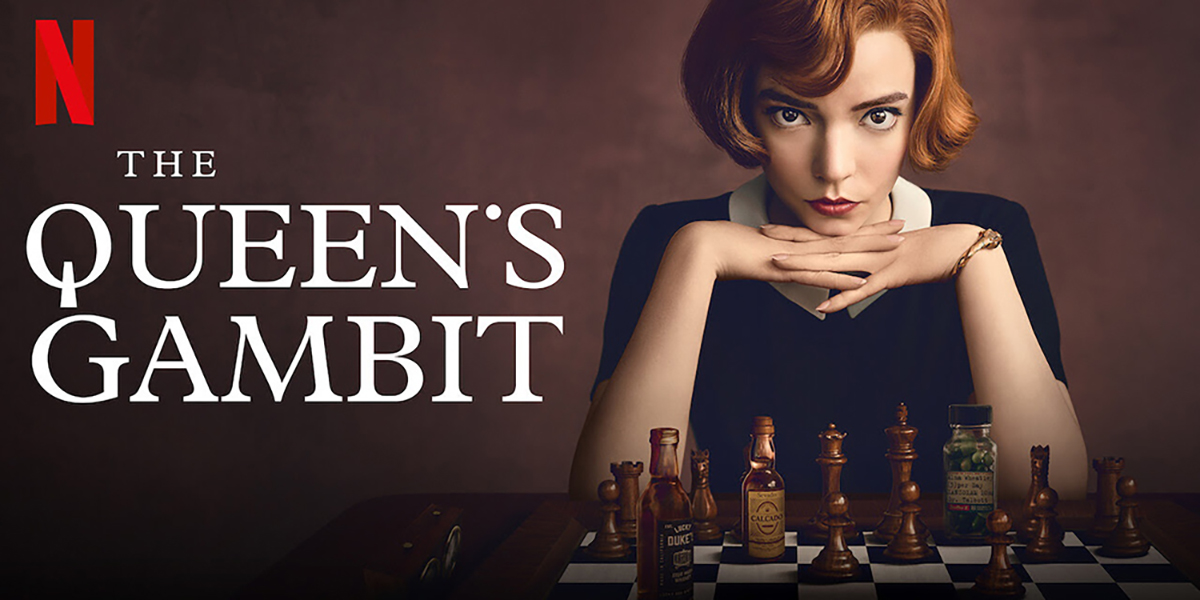Although it isn’t perfect, it makes chess compelling
The Queen’s Gambit, a Netflix series released near the end of last year, has quickly become a cultural phenomenon that’s ushered in a resurgence in chess. The series, based on an ‘80s novel of the same name, follows Elizabeth “Beth” Harmon, an orphan and chess prodigy who struggles with rising through the ranks of competitive chess, and with her own demons in the form of substance abuse and addiction. It’s a charming series that captures the aesthetics of the ‘60s as well as the complexities of the game it focuses on, but it isn’t without its faults.
One of the biggest successes of the series, and its drawing factor, is that it manages to make chess look cool. For anyone who’s frequented chess matches, they’re often a quiet, reflective, focus-heavy ordeal. Time is taken between each move to think ahead and analyze the board, and overall it’s not particularly exciting for a general audience — especially when someone isn’t familiar with the rules. What creators Scott Frank and Allan Scott are able to do, however, is make the matches seem breakneck and the individual moves less consequential.
The Queen’s Gambit doesn’t overly concern itself with trying to teach the audience about chess. Instead, it focuses on the rising stakes and the outcome of games. Viewers don’t understand the meaning behind each move Beth makes, but they can follow along with the fact that she’s winning or losing. This is sometimes to the detriment of the show though, since the cinematographer has a tendency to “show, don’t tell.” An opponent might make a move that causes Beth to seem uneasy, but we have no context other than facial expressions to determine what’s going on in her head or the game. At times these scenes will be interjected with a narrator (Beth, after the match, or a radio broadcaster) explaining the significance of the moves, but this doesn’t happen enough. The result is episodes that leave viewers thinking they missed something or wondering if something happened that wasn’t fully explained or acknowledged.
Additionally, although the series is thrilling from an action and suspense perspective, its protagonist’s development remains empty. After the last episode, you’re not sure why you’re rooting for Beth or if she’s actually grown as a person. She’s faced adversity, yes, and it’s easy to sympathize with her, but what else is there to her? Beth always seems to come out on top with little effort. There are few moments where she shows vulnerability or self-doubt, and Beth is never shown losing or entering into a draw except with key players she ends up later overcoming. Even the theme of addiction doesn’t seem to come to any satisfying conclusion, whether that be Beth deciding to quit substances for good or acknowledging why she was abusing them. The Queen’s Gambit is a show that focuses more on its stakes, period-piece aesthetics, and action than its character development — and it shows.
However, perhaps more important than The Queen’s Gambit itself is its cultural after-effect. Chess.com has reported millions of new players since the show’s debut, and, similarly, marketing research company NPD Group has marked that chess set and book sales have skyrocketed in the same time frame. The pandemic is a time when people have begun adopting new skills, like baking bread, learning an instrument, or picking up chess. It’s a perfect time for this Netflix series to meet the market and breathe life into this centuries-old game.
The Queen’s Gambit as a Netflix series has risen in popularity for good reason: it manages to make chess compelling, high stakes, and action-packed. While a chess-centred show may seem like a niche storyline, it manages to capture universal themes and remain accessible to a general audience. It’s an unlikely hit, and though it isn’t without its faults, it’s still a series that should be checked out just to see what all the fuss is about.
The Queen’s Gambit (Netflix)
Chandy is a biology major/chemistry minor who's been a staff writer, Arts editor, and Managing Editor at The Cascade. She began writing in elementary school when she produced Tamagotchi fanfiction to show her peers at school -- she now lives in fear that this may have been her creative peak.


